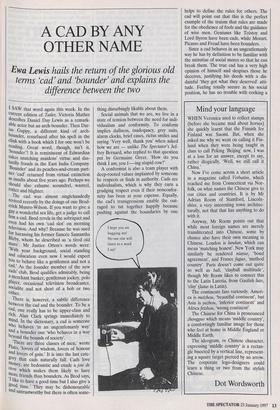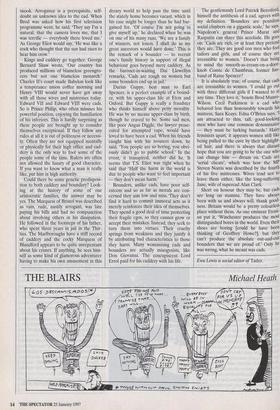A CAD BY ANY OTHER NAME
Ewa Lewis hails the return of the glorious old
terms 'cad' and 'bounder' and explains the difference between the two
I SAW that word again this week. In the current edition of Tatler, Victoria Mather describes Daniel Day Lewis as a remark- able actor but an arch-bounder. Then Dar- n's Guppy, a different kind of arch- bounder, resurfaced after his spell in the clink with a book which I for one won't be reading. Great word, though, isn't it, bounder'? It is reminiscent of Edwardian rakes snatching maidens' virtue and das- tardly frauds in the East India Company. Bounder' and its peaches-and-cream part- ner 'cad' returned from virtual extinction as insults about five years ago. Perhaps we should also exhume scoundrel, wastrel, rotter and blighter. The cad was almost singlehandedly revived recently by the doings of one Brod- erick Munro-Wilson. If you want to give a guy a wonderful sex life, get a judge to call barn a cad. Brod revels in the sobriquet and even had his own 'cad slot' on morning television. And why? Because he was sued for harassing his former fiancée Samantha Bleby, whom he described as 'a tired old mare'. Mr Justice Otton's words were: With your background, social standing and education even now I would expect You to behave like a gentlemen and not a cad.' As the founder member of the new Cads' club, Brod qualifies admirably, being a merchant banker, gentleman jockey, polo Player, occasional television broadcaster, socialite and not short of a bob or two either.
There is, however, a subtle difference between the cad and the bounder. To be a 1c,1:1, one really has to be upper-class and rich. Alan Clark springs immediately to mind. In the dictionary, a cad is someone who behaves 'in an ungentlemanly way' and a bounder one 'who behaves in a way beyond the bounds of society'. `There are three classes of men,' wrote Plato, 'lovers of wisdom, lovers of honour and lovers of gain.' It is into the last cate- gory that cads naturally fall. Cads love ntoney, are hedonistic and exude a joie de vwre which makes them likely to have more friends than bounders. As Brod says, like to have a good time but I also give a good time.' They may be dishonourable and untrustworthy but there is often some- thing disturbingly likable about them.
Social animals that we are, we live in a state of tension between the need for indi- vidualism and conformity. To conform implies dullness, inadequacy, grey suits, alarm clocks, brief cases, rictus smiles and saying 'Very well, thank you' when asked how we are — unlike The Spectator's Jef- frey Bernard, who replied to that question put by Germaine Greer, 'How do you think I am, you f—ing stupid cow?' A conformist is also a team player with deep-rooted values implanted by someone he respects or finds in authority. Cads are individualists, which is why they earn a grudging respect even if their nonconfor- mity has been at your expense. Equally, the cad's transgressions enable the out- raged to tut together happily because pushing against the boundaries by one helps to define the rules for others. The cad will point out that this is the perfect example of the truism that rules are made for the obedience of fools and the guidance of wise men. Geniuses like Tolstoy and Lord Byron have been cads, while Mozart, Picasso and Freud have been bounders.
Since a cad behaves in an ungentlemanly way he has by definition to be familiar with the minutiae of social mores so that he can break them. The true cad has a very high opinion of himself and despises those he deceives, justifying his deeds with a dis- dainful 'they got what they deserved' atti- tude. Feeling totally secure in his social position, he has no trouble with cocking a snook. Arrogance is a prerequisite, self- doubt an unknown idea to the cad. When Brod was asked how his first television programme went, he said, 'They say I'm a natural, that the camera loves me, that I was terrific — everybody there loved me.' As George Eliot would say, 'He was like a cock who thought that the sun had risen to hear him crow.'
Kings and caddery go together. George Bernard Shaw wrote, 'Our country has produced millions of blameless greengro- cers but not one blameless monarch.' Charles II's court made Babylon look like a temperance union coffee morning and Henry VIII would never have got away with all those wives and mistresses today. Edward VII and Edward VIII were cads. So is Prince Philip, who often misuses his powerful position, enjoying the humiliation of his inferiors. This is hardly surprising as these people are brought up to consider themselves exceptional. If they follow any rules at all it is out of politeness or necessi- ty. Often they are not equipped mentally or physically for their high office and cad- dery is the only way to fool some of the people some of the time. Rulers are often not allowed the luxury of good character. If you want to know what a man is really like, put him in high authority.
Could there be some genetic predisposi- tion to both caddery and boundary? Look- ing at the history of some of our aristocratic families, the answer may be yes. The Marquess of Bristol was described as vain, rude, nastily arrogant, was late paying his bills and had no compunction about involving others in his dissipation. He followed in the footsteps of his father, who spent three years in jail in the Thir- ties. The Marlboroughs have a stiff record of caddery and the cocky Marquess of Blandford appears to be quite unrepentant about his crimes. If anything, he sees him- self as some kind of glamorous adventurer having to make his own amusement in this dreary world to help pass the time until the stately home becomes vacant, which in his case might be longer than he had bar- gained for. 'Of course I'm not going to give myself up,' he declared when he was on one of his many runs. 'We are a family of winners, not losers. I shall do as my great ancestors would have done.' This is the remark of a bounder — to recruit one's family history in support of illegal behaviour goes beyond mere caddery. As the baronet-in-waiting Dai Llewellyn remarks, 'Cads are rough on women but some bounders end up in jail.'
Darius Guppy, best man to Earl Spencer, is a perfect example of a bound- er, with his upper-class life at Eton and Oxford. But Guppy is really a fraudster who thinks himself above petty morality. He was by no means upper-class by birth, though he craved to be. Some sad men, like poor Angus Diggle, the lawyer prose- cuted for attempted rape, would have loved to have been a cad. When his friends caught him with his trousers down, he said, 'You people are so boring, you obvi- ously didn't go to public school.' In the event, it transpired, neither did he. It seems that T.S. Eliot was right when he said that 'Half the harm in the world is due to people who want to feel important — they don't mean harm.'
Bounders, unlike cads, have poor self- esteem and so as far as morals are con- cerned they aim low and miss. 'They don't find it hard to commit immoral acts as it merely reinforces their idea of themselves. They spend a good deal of time protecting their fragile egos, so they cannot grow or accept their mistakes. Instead, they seek to turn them into virtues. Their cruelty springs from weakness and they justify it by attributing bad characteristics to those they harm. Many womanising cads and bounders are actually misogynists, like Don Giovanni. The concupiscent Lord Errol paid for his caddery with his life. The gentlemanly Lord Patrick Beresford, himself the antithesis of a cad, agrees with my definition. 'Bounders are penniless social climbers on a gigantic scale,' he says. Napoleon's general Prince Murat and Rasputin can share this accolade. He goes on: 'Cads are rich, or at least they pretend they are. They are good con men who fool tailors and girls, and of course they are irresistible to women.' Doesn't that bring to mind the smooth-as-cream-on-a-door- knob Comte de Chambrun, former hus- band of Raine Spencer? It is absolutely true, of course, that cads are irresistible to women. 'I could go out with three different girls if I wanted to at any time. They love it,' boasts Brod Munro- Wilson. Cecil Parkinson is a cad who behaved less than honourably towards his mistress, Sara Keays. Edna O'Brien says, am attracted to thin, tall, good-looking men who have one common denominator — they must be lurking bastards.' Hairy feminists apart, it appears women still like being pulled to the cave by their highlight- ed hair, and there is always that distant hope that you are going to be the one who can change him — dream on. Cads are `serial cheats', which was how the MP Steven Norris was described by the fourth of his five mistresses. Wives tend not to leave them either, like the long-suffering Jane, wife of supercad Alan Clark. Short on honour they may be, but cads are long on stamina. They have always been with us and always will, thank good- ness. Britain would be a pretty colourless place without them. As one eminent Etoni- an put it, 'Winchester produces the most distinguished bores in the world. Even their shoes are boring [could he have been thinking of Geoffrey Howe?], but they can't produce the absolute out-and-out bounders that we are proud of.' Only he was wrong, what he meant was cads.
Ewa Lewis is social editor of Tatler.



































































 Previous page
Previous page